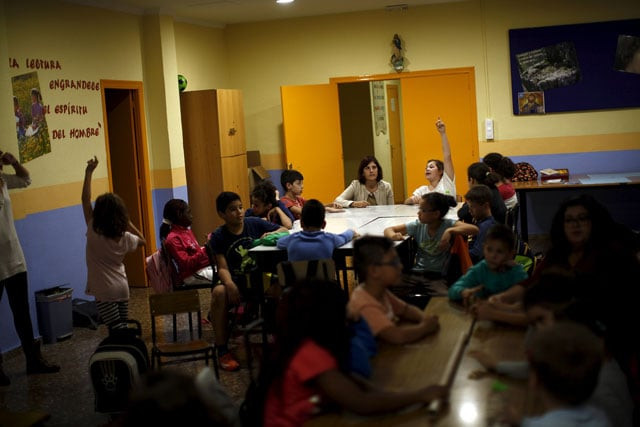Child poverty grows in Spain despite economic rebound
According to EU figures, more than one in three children are at risk of poverty or social exclusion

Spain is facing rising levels of child poverty as its economic recovery fails to bridge a growing gulf between rich and poor, storing up problems for an already-strained social security system.
While the country has emerged from recession and become one of the fastest-growing economies in Europe, more than one in three children — or 2.6 million — are at risk of poverty or social exclusion, according to latest EU figures.
All work and no play: Myanmar's children prop up economy
High levels of long-term unemployment coupled with spending cuts to healthcare and education have pushed more families and young children below the breadline even as the economy picks up.
 Children pose for a photo as they play at a square while attending a programme that gives children academic and psychological help to improve their chances in life, outside a Catholic charity Caritas centre in the neighborhood of Puente Tocinos, near Murcia, southeast Spain on November 3, 2015. PHOTO: REUTERS
Children pose for a photo as they play at a square while attending a programme that gives children academic and psychological help to improve their chances in life, outside a Catholic charity Caritas centre in the neighborhood of Puente Tocinos, near Murcia, southeast Spain on November 3, 2015. PHOTO: REUTERSInequality is set to be a key issue in a December election where the ruling centre-right People's Party is running a campaign focusing on how Spain pulled back from the brink of an international bail-out to become the euro zone poster child for careful debt management through austerity measures.
The opposition Socialists and leftist newcomer Podemos however have seized on growing rates of poverty as a sign that the economic rebound has failed to reach many households.
In the southern region of Murcia, which has one of the highest poverty rates in Spain, divorced mother Victoria Belmonte has spent years looking for work from factories to supermarkets.
 Children do their homework while attending a programme that gives children academic and psychological help to improve their chances in life, at a Catholic charity Caritas centre in the neighborhood of Puente Tocinos, near Murcia, southeast Spain on November 3, 2015. PHOTO: REUTERS
Children do their homework while attending a programme that gives children academic and psychological help to improve their chances in life, at a Catholic charity Caritas centre in the neighborhood of Puente Tocinos, near Murcia, southeast Spain on November 3, 2015. PHOTO: REUTERSSince her state benefit dried up in June, the 42-year-old former beautician has relied on charity handouts and her own mother's pension to feed and clothe her four children.
"My income at the moment is zero euros," she said in a church-owned building in Puente Tocinos, a working-class suburb of the city of Murcia, where volunteers were helping children with their homework.
400,000 Syrian refugee children not in school in Turkey: HRW
"The most difficult part is the children because they want to do things, but they can't," she added. "I'm trying to live day-to-day but I worry about the future. What will happen for example if one of my kids wants to go to university?"
Vicious circle
The growing number of impoverished children heaps more pressure on a social security system struggling with one of the fastest-ageing populations in the world.
Children trapped in poverty and denied opportunities could end up on benefits instead of turning into the tax-paying workers that the system desperately needs, say campaigners and economists.
 Children do their homework while attending a programme that gives children academic and psychological help to improve their chances in life, at a Catholic charity Caritas centre in the neighborhood of Puente Tocinos, near Murcia, southeast Spain on November 3, 2015. PHOTO: REUTERS
Children do their homework while attending a programme that gives children academic and psychological help to improve their chances in life, at a Catholic charity Caritas centre in the neighborhood of Puente Tocinos, near Murcia, southeast Spain on November 3, 2015. PHOTO: REUTERS"They will be adults stunted in reaching their potential. They will probably be adults dependent on social security," said Andres Conde, head of Save the Children in Spain.
The proportion of children under 16 classed as at risk of poverty or social exclusion in Spain reached 35.4 per cent last year, the highest in the euro zone bar Greece where riots and strikes against austerity measures in recent days have revived memories of the height of the euro zone debt crisis.
The figure, which is 10 percentage points above the euro zone average, has risen sharply from 31.9 per cent in 2013, when the economy emerged from over five years of downturn.
The EU indicator, known as AROPE, is calculated taking into account factors such as relative household income compared with the national average and the ability to afford basic items like adequate heating or a washing machine.
A key cause of child poverty is the high number of people jobless for more than two years — which stands at nine times the level seen in 2008 in a country where the job seekers' welfare benefit ends after around 18 months.
Against child labour: World’s third largest underage workforce in Pakistan
"The loss of work and reduction of wages is concentrated among adults living with children. Therefore children run a greater chance of being poor than other sectors of the population," said Salvador Perez-Moreno, professor at the applied economics department of the University of Malaga.
Spain's unemployment rate has fallen to around 21 per cent from 26 per cent since the recession ended in 2013, but the proportion of jobless who have been unemployed for two years or more has jumped by about 10 percentage points.
Few hours, low pay
Murcia, known for its golf resorts, was gripped by construction fever during the boom years and the 2008 property crash left many without work or qualifications, said Victor Martinez, the regional People's Party spokesman.
"The recovery is real, our country is coming out of crisis," he told Reuters. "But that recovery is taking a long time to reach individuals and firms."
Belmonte's ex-husband, for example, was a plumber before the recession, earning enough to support her as a stay-at-home mother to their children now aged 6 to 16. But his business went bust and he now has no income.
Although unemployment is falling, much of the work available is of low quality, with poor wages and limited hours meaning even those in employment struggle to make ends meet.
The salaries of Spain's lowest earners has declined over the past seven years. The number of people living in households where adults worked for less than a fifth of normal working hours over the past year has more than doubled in Spain since the start of the downturn — the biggest leap in the EU.
In Puente Tocinos, Catholic charity Caritas has set up one of many programs around the country supporting children with academic and psychological help in the hope of improving their chances in life.
Around 35 children aged six to 12 gathered around tables to finish their homework before taking a snack of a tuna roll and fruit juice into the square outside for a break.
Priest Jose Antonio Cano, who oversees the program, said most were children from ordinary families that had been hit hard by the recession. "We realized that if we didn't help them with their education, the cycle would just repeat itself."
Spain is facing rising levels of child poverty as its economic recovery fails to bridge a growing gulf between rich and poor, storing up problems for an already-strained social security system.
While the country has emerged from recession and become one of the fastest-growing economies in Europe, more than one in three children - or 2.6 million - are at risk of poverty or social exclusion, according to latest EU figures.
High levels of long-term unemployment coupled with spending cuts to healthcare and education have pushed more families and young children below the breadline even as the economy picks up.
Inequality is set to be a key issue in a December election where the ruling center-right People's Party is running a campaign focusing on how Spain pulled back from the brink of an international bail-out to become the euro zone poster child for careful debt management through austerity measures.
The opposition Socialists and leftist newcomer Podemos however have seized on growing rates of poverty as a sign that the economic rebound has failed to reach many households.
In the southern region of Murcia, which has one of the highest poverty rates in Spain, divorced mother Victoria Belmonte has spent years looking for work from factories to supermarkets.
Since her state benefit dried up in June, the 42-year-old former beautician has relied on charity handouts and her own mother's pension to feed and clothe her four children.
"My income at the moment is zero euros," she said in a church-owned building in Puente Tocinos, a working-class suburb of the city of Murcia, where volunteers were helping children with their homework.
"The most difficult part is the children because they want to do things, but they can't," she added. "I'm trying to live day-to-day but I worry about the future. What will happen for example if one of my kids wants to go to university?"
VICIOUS CIRCLE
The growing number of impoverished children heaps more pressure on a social security system struggling with one of the fastest-ageing populations in the world.
Children trapped in poverty and denied opportunities could end up on benefits instead of turning into the tax-paying workers that the system desperately needs, say campaigners and economists.
"They will be adults stunted in reaching their potential. They will probably be adults dependent on social security," said Andres Conde, head of Save the Children in Spain.
The proportion of children under 16 classed as at risk of poverty or social exclusion in Spain reached 35.4 percent last year, the highest in the euro zone bar Greece where riots and strikes against austerity measures in recent days have revived memories of the height of the euro zone debt crisis.
The figure, which is 10 percentage points above the euro zone average, has risen sharply from 31.9 percent in 2013, when the economy emerged from over five years of downturn.
The EU indicator, known as AROPE, is calculated taking into account factors such as relative household income compared with the national average and the ability to afford basic items like adequate heating or a washing machine.
A key cause of child poverty is the high number of people jobless for more than two years - which stands at nine times the level seen in 2008 in a country where the job seekers' welfare benefit ends after around 18 months.
"The loss of work and reduction of wages is concentrated among adults living with children. Therefore children run a greater chance of being poor than other sectors of the population," said Salvador Perez-Moreno, professor at the applied economics department of the University of Malaga.
Spain's unemployment rate has fallen to around 21 percent from 26 percent since the recession ended in 2013, but the proportion of jobless who have been unemployed for two years or more has jumped by about 10 percentage points.
FEW HOURS, LOW PAY
Murcia, known for its golf resorts, was gripped by construction fever during the boom years and the 2008 property crash left many without work or qualifications, said Victor Martinez, the regional People's Party spokesman.
"The recovery is real, our country is coming out of crisis," he told Reuters. "But that recovery is taking a long time to reach individuals and firms."
Belmonte's ex-husband, for example, was a plumber before the recession, earning enough to support her as a stay-at-home mother to their children now aged 6 to 16. But his business went bust and he now has no income.
Although unemployment is falling, much of the work available is of low quality, with poor wages and limited hours meaning even those in employment struggle to make ends meet.
The salaries of Spain's lowest earners has declined over the past seven years. The number of people living in households where adults worked for less than a fifth of normal working hours over the past year has more than doubled in Spain since the start of the downturn - the biggest leap in the EU.
In Puente Tocinos, Catholic charity Caritas has set up one of many programs around the country supporting children with academic and psychological help in the hope of improving their chances in life.
Around 35 children aged six to 12 gathered around tables to finish their homework before taking a snack of a tuna roll and fruit juice into the square outside for a break.
Priest Jose Antonio Cano, who oversees the program, said most were children from ordinary families that had been hit hard by the recession.
"We realized that if we didn't help them with their education, the cycle would just repeat itself."
Read more at Reutershttp://www.reuters.com/article/2015/11/13/us-spain-economy-inequality-idUSKCN0T20YT20151113#2XU82hXsykCsqopU.99



















COMMENTS
Comments are moderated and generally will be posted if they are on-topic and not abusive.
For more information, please see our Comments FAQ